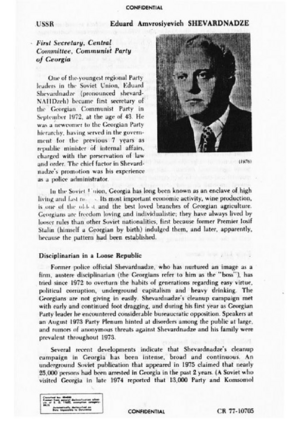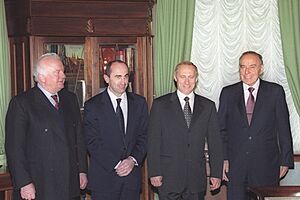Eduard Shevardnadze facts for kids
Quick facts for kids
Eduard Shevardnadze
|
|
|---|---|
|
ედუარდ შევარდნაძე
|
|
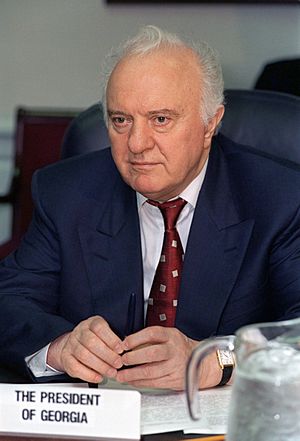
Shevardnadze in 1997
|
|
| 2nd President of Georgia | |
| In office 26 November 1995 – 23 November 2003 |
|
| Preceded by | Zviad Gamsakhurdia |
| Succeeded by | Nino Burjanadze (acting) |
| 1st Chairman of the Georgian Parliament | |
| In office 6 November 1992 – 26 November 1995 |
|
| Preceded by | Parliament established;
Himself as Chairman of the State Council of Georgia
|
| Succeeded by | Zurab Zhvania |
| Chairman of the State Council of Georgia | |
| In office 10 March 1992 – 4 November 1992 |
|
| Preceded by | State Council established;
Military Council as interim head of state
|
| Succeeded by | State Council abolished;
Himself as Chairman of the Georgian Parliament
|
| Minister of Foreign Affairs of the Soviet Union | |
| In office 2 July 1985 – 20 December 1990 |
|
| Appointed by | Mikhail Gorbachev |
| Premier | |
| Preceded by | Andrei Gromyko |
| Succeeded by | Aleksandr Bessmertnykh |
| In office 19 November 1991 – 26 December 1991 |
|
| Premier | Ivan Silayev |
| Preceded by | Boris Pankin (acting) |
| Succeeded by | Position abolished |
| First Secretary of the Georgian Communist Party | |
| In office 29 September 1972 – 6 July 1985 |
|
| Preceded by | Vasil Mzhavanadze |
| Succeeded by | Jumber Patiashvili |
| Full member of the 26th and 27th Politburo | |
| In office 1 July 1985 – 14 July 1990 |
|
| Minister of Internal Affairs of the Georgian SSR | |
| In office 22 May 1965 – 1972 |
|
| Preceded by | Otar Kavtanadze |
| Succeeded by | Konstantin Ketiladze |
| Personal details | |
| Born | 25 January 1928 Mamati, Guria, Georgian SSR, Transcaucasian SFSR, Soviet Union (now Georgia) |
| Died | 7 July 2014 (aged 86) Tbilisi, Georgia |
| Nationality |
|
| Political party |
|
| Spouse |
Nanuli Tsagareishvili
(m. 1951; died 2004) |
| Children | 2 |
| Relatives | Sophie Shevardnadze (granddaughter) |
| Awards | |
| Religion | Georgian Orthodox Church |
| Signature | |
| Military service | |
| Allegiance | |
| Branch/service | MVD |
| Years of service | 1964–1972 |
| Rank | |
| Commands |
|
Eduard Shevardnadze (born January 25, 1928 – died July 7, 2014) was an important politician and diplomat from both the Soviet Union and Georgia. He led Georgia for many years, from 1972 until he stepped down in 2003. He also served as the last Soviet Minister of Foreign Affairs from 1985 to 1990.
Shevardnadze began his political journey in the late 1940s. He started as a leader in a youth organization called Komsomol. He quickly moved up in the Georgian Soviet government. In 1961, he was briefly removed from his position after upsetting a senior official. After a couple of years, he returned to politics. He became known for fighting against corruption. This work caught the attention of the Soviet government.
He became the leader of Soviet Georgia from 1972 to 1985. During this time, he started new economic plans. These plans helped Georgia's economy grow, which was unusual because other parts of the Soviet Union were struggling. His fight against corruption continued throughout his time as leader.
In 1985, Mikhail Gorbachev chose Shevardnadze to be the Minister of Foreign Affairs for the Soviet Union. He held this job until the Soviet Union broke apart in 1991. He was a key figure in Soviet foreign policy, second only to Gorbachev. Shevardnadze made many important decisions during this time. He was seen by other countries as a symbol of Soviet reforms like Perestroika (restructuring) and Glasnost (openness).
After the Soviet Union collapsed in 1991, Shevardnadze returned to the newly independent Republic of Georgia. He was asked to lead the country by a group called the Military Council. This group had recently removed Georgia's first president, Zviad Gamsakhurdia. In 1992, Shevardnadze became the leader of Georgia as the Chairman of Parliament. He was officially elected president in 1995.
During his time as president, Georgia faced many challenges. A peace treaty was signed in Sochi to end fighting in South Ossetia. However, Georgia lost control over a large part of that area. A war also started in Abkhazia in 1992, which Georgia also lost. Shevardnadze also led the government during a civil war in 1993. This war was against supporters of the former president, Gamsakhurdia. Shevardnadze joined Georgia with the Commonwealth of Independent States to get help from Russia to end the conflict. Georgia also became closer to the European Union and the United States. It joined the Council of Europe in 1999 and wanted to join NATO in 2002.
Shevardnadze oversaw big changes like selling state-owned businesses to private owners. However, his time as president was also known for a lot of corruption. There were claims of electoral fraud (cheating in elections) during the 2003 election. This led to large public protests known as the Rose Revolution. Shevardnadze eventually agreed to step down. He later wrote his memories and lived a quiet life until he passed away in 2014.
Contents
Early Life and Political Beginnings
Eduard Shevardnadze was born on January 25, 1928, in a village called Mamati in the Soviet Union. His father was a teacher and a strong supporter of the Communist Party. Eduard joined the Georgian Communist Party and the main Communist Party of the Soviet Union in 1948 when he was 20.
He moved up quickly in the Georgian youth organization, Komsomol. He became its First Secretary, a top leadership role. During this time, he first met Mikhail Gorbachev. Shevardnadze later said he became unsure about the Soviet political system after a famous speech by Nikita Khrushchev in 1956. This speech revealed many terrible things done by Joseph Stalin. Shevardnadze was also shocked by how the Soviet government reacted to protests in Georgia in 1956. In 1961, he was temporarily removed from his position for upsetting a senior official.
After a few years, Shevardnadze returned to politics in Tbilisi. He became known for challenging and accusing the city's leader of corruption. This led to his promotion in 1964 to a high position in the Ministry of Internal Affairs of the Georgian SSR. In 1965, he became the Minister of Internal Affairs. He started a successful campaign against corruption, which was supported by the Soviet government. This helped him become the First Secretary (leader) of the Georgian Communist Party in 1972.
In 1951, Shevardnadze married Nanuli Shevardnadze. Her father had been killed by the authorities during a time of political purges. Nanuli was worried that her family background would harm Eduard's political career.
Leading Georgia's Communist Party (1972–85)
The Soviet government appointed Shevardnadze as the First Secretary of the Georgian Communist Party. His main job was to stop illegal trading and black-market activities that had grown under the previous leader.
Fighting Corruption in Georgia
Shevardnadze's quick rise in politics was largely due to his strong fight against corruption. During his leadership, anti-corruption campaigns were very important. At that time, Georgia was the Soviet republic with the most corruption. The previous leader's time was marked by weak leadership, favoritism, and bribery. For example, only 68 percent of Georgian goods were legally exported, while other Soviet republics had almost 100 percent legal exports.
Shevardnadze used clever methods to fight corruption. Once, he stopped all exports and then dressed as a farmer. He drove a car full of tomatoes across the border to see if he would be stopped. After this, the entire Georgian border police were removed from their jobs. There's a story that he asked officials to show their left hands. Those wearing Western-made watches were told to replace them with Soviet ones. This story showed him as a strong fighter against corruption. However, his campaign didn't completely solve the problem. When he returned to Georgia in 1992, corruption was still a big issue.
Economic Changes and New Ideas
Under Shevardnadze, Georgia was one of the few Soviet republics that did not experience economic slowdown. Instead, it saw fast economic growth. By 1974, factory output increased by 9.6 percent, and farm output grew by 18 percent. The problem of goods shortages, common elsewhere in the Soviet Union, almost disappeared in Georgia. Long food lines in Tbilisi became shorter, while those in Moscow grew longer. Some of Shevardnadze's economic ideas were even used by the Soviet government across the country.
In 1973, Shevardnadze started a farming reform called the "Abasha experiment." This idea was inspired by Hungary's farming policies, which gave more decision-making power to local farmers. Shevardnadze combined all farming groups in Abasha into one. He also created a new payment system. If farmers met their production goals early, they would get a share of the crops. This policy helped Georgia's economy. Because of the big increase in farm output in Abasha, the reform was used in other parts of Georgia. This farming reform became a model for national agricultural organizations created in 1982.
Shevardnadze took a lot of credit for Georgia's good economic performance. He said that Georgia had many economic experiments that would make economic management more democratic.
Political Experiments and National Identity
Shevardnadze supported political changes in Georgia. He created groups to study public opinion. These groups worked closely with Georgia's media. Government ministers and Shevardnadze himself often appeared live on television. He encouraged criticism of his government, especially during party meetings. He showed that he believed in "people's democracy," meaning power coming from the people.
Earlier Georgian leaders had sometimes favored Georgians over other groups. Shevardnadze was against this. He believed that "extreme nationalism" and corruption were major problems for economic growth. He criticized what he called "national narrow-mindedness." In the 1970s, there was a rise in national feelings in Georgia. In 1978, protests happened because the Soviet government wanted to change the Georgian constitution. They wanted to remove the Georgian language as the only official state language. Shevardnadze first supported the Soviet government. But he quickly changed his mind and found a way to compromise with the government and the protesters. The Georgian language remained the only official language.
Another challenge during the 1978 protests came from some Abkhaz intellectuals. They wanted the Abkhaz Autonomous Soviet Socialist Republic to leave Georgia and join Russia. To stop this, the Georgian government made some agreements. These included creating an Abkhaz university, more Abkhaz publications, and an Abkhaz television station. Shevardnadze actively supported protecting the interests of minority groups.
National Politics and Resignation
Shevardnadze was a loyal supporter of the Soviet Union's top leaders. He praised Leonid Brezhnev and later Konstantin Chernenko. However, when Yuri Andropov became leader, Shevardnadze quickly supported him. Andropov, in turn, appreciated Shevardnadze's reforms. When Chernenko died, Shevardnadze strongly supported Mikhail Gorbachev to become the new leader.
Shevardnadze became a member of the main committee of the Communist Party of the Soviet Union in 1976. In 1978, he became a candidate member of the Soviet Politburo, a very powerful group. His big chance came in 1985. The long-serving Soviet Minister of Foreign Affairs, Andrei Gromyko, moved to a less powerful role. Mikhail Gorbachev, the new Soviet leader, appointed Shevardnadze to replace Gromyko. This helped Gorbachev gather a group of younger reformers around him.
Soviet Foreign Minister (1985–91)
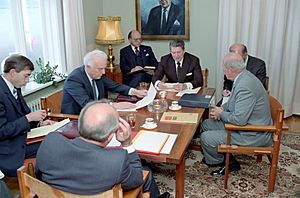
Shevardnadze was a close friend of Gorbachev. He strongly supported Gorbachev's reform policies of glasnost (openness) and perestroika (restructuring). He played a very important role in easing tensions that led to the end of the Cold War. He worked with the United States to create agreements about nuclear weapons. He helped end the war in Afghanistan, allowed Germany to reunite, and pulled Soviet troops out of Eastern Europe and from the border with China. People sometimes called him "The Silver Fox" because of his cleverness.
In the late 1980s, as the Soviet Union faced problems, Shevardnadze became less popular. He disagreed with hard-line officials who did not like his reforms or his friendly approach to Western countries. He spoke out against Soviet troops putting down an uprising in his home country of Georgia in 1989. In December 1990, he suddenly resigned. He said he feared that "Dictatorship is coming." A few months later, his fears partly came true when a failed coup by Communist hardliners led to the collapse of the Soviet Union. Shevardnadze briefly returned as Soviet Foreign Minister in November 1991. But he resigned again a month later when the Soviet Union officially dissolved.
In 1991, Shevardnadze was baptized into the Georgian Orthodox Church.
President of Georgia (1995–2003)
Becoming President
After Georgia became independent, its first president was Zviad Gamsakhurdia. He was a scientist and writer who had been jailed by Shevardnadze's government years earlier. However, Gamsakhurdia's rule ended suddenly in January 1992. He was removed from power in a violent overthrow. Shevardnadze was then appointed Speaker of the Georgian parliament in March 1992. This role was similar to being president. When the presidency was brought back in November 1995, he was elected with 70% of the votes. He won a second term in April 2000, but there were many claims of vote-rigging (cheating) in that election.
His Time in Power
Shevardnadze's time as Georgian President was in some ways harder than his time as Soviet Foreign Minister. He had many opponents, some from his earlier campaigns against corruption. A civil war started in western Georgia in 1993 between Shevardnadze's supporters and Gamsakhurdia's supporters. This war ended with help from Russia and the death of ex-President Gamsakhurdia. Shevardnadze survived three attempts on his life in 1992, 1995, and 1998. In 1995, he survived a car bomb attack outside the parliament building in Tbilisi. In 1998, his group of cars was attacked by armed men, and two of his bodyguards were killed.
Shevardnadze also faced conflicts with regions like South Ossetia and Abkhazia that wanted to separate from Georgia. The war in Chechnya (a region in Russia bordering Georgia) caused problems with Russia. Russia accused Shevardnadze of hiding Chechen fighters. In return, Russia seemed to support Georgian groups that wanted to separate. Shevardnadze's close relationship with the United States also caused tension with Russia. The U.S. saw him as a way to balance Russia's influence in the important Transcaucasus region. Under Shevardnadze, Georgia received a lot of aid from the U.S. It also signed a partnership with NATO and said it wanted to join both NATO and the European Union.
At the same time, Georgia suffered a lot from crime and widespread corruption. This corruption was often carried out by powerful officials and politicians. Even though Shevardnadze himself was not personally corrupt, he seemed unable to stop corruption at the highest levels. Many of his closest advisors, including family members, became very wealthy. Organizations like Transparency International listed Georgia as one of the most corrupt countries in the world.
His Downfall
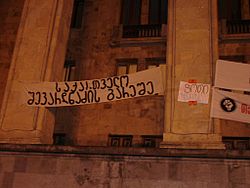
On November 2, 2003, Georgia held a parliamentary election. Many international observers said the election was unfair. This made many Georgians very angry. It led to large protests in Tbilisi and other cities, known as the Rose Revolution. On November 22, protesters broke into the parliament building. This forced President Shevardnadze to leave with his bodyguards. The next day, Shevardnadze met with opposition leaders Mikheil Saakashvili and Zurab Zhvania. This meeting was arranged by the Russian Foreign Minister. After the meeting, Shevardnadze announced his resignation. He said he wanted to prevent a bloody power struggle. He hoped his resignation would bring a peaceful end without any violence or deaths. Shevardnadze's resignation marked the end of his political career.
Death and Funeral
Shevardnadze spent his final years living quietly at his home outside Tbilisi. As his health got worse, he became less involved in public life. After a long illness, he passed away on July 7, 2014, at the age of 86.
Georgia's former president Giorgi Margvelashvili and Prime Minister Irakli Garibashvili sent their condolences to his family. Margvelashvili called him "one of the distinguished politicians of the 20th century." He said Shevardnadze helped end the Soviet system and played a big part in creating modern Georgia. Garibashvili said Shevardnadze's "contribution was especially important in establishing Georgia's role in the modern world." Former President Mikheil Saakashvili, who led the Rose Revolution against Shevardnadze, also offered condolences. He said Shevardnadze was "a significant figure for the Soviet empire and for post-Soviet Georgia."
Leaders from other countries also offered their sympathy. Russian President Vladimir Putin and U.S. Secretary of State John Kerry sent condolences. Kerry said Shevardnadze played "an instrumental role" in ending the Cold War. He also helped reduce "the risk of nuclear confrontation" as the Soviet Foreign Minister. As President of Georgia, he worked to ensure "the sovereignty and territorial integrity of [Georgia]." He also put the country "on its irreversible path toward Euro-Atlantic integration."
Shevardnadze was given a state funeral on July 13, 2014. Georgian political leaders and foreign guests attended, including former U.S. Secretary of State James Baker and former German Foreign Minister Hans-Dietrich Genscher. After a service at the Holy Trinity Cathedral of Tbilisi, Shevardnadze was buried next to his late wife, Nanuli Shevardnadze, in Tbilisi.
Honours and Awards
Eduard Shevardnadze received many honors and awards during his long career.
National Honours
- Soviet Union:
- 1981 – Hero of Socialist Labour (a high award for work)
- 1981 – Five Orders of Lenin (a top Soviet award)
Foreign Honours
- 1999 – Germany: Order of Merit of the Federal Republic of Germany
- 1999 – Ukraine: 1st class Order of Prince Yaroslav the Wise
- 2000 – United Kingdom: Knight Grand Cross of the Order of St Michael and St George
Honorary Degrees
- In 1991, he received an honorary degree from Harvard University.
- In 1991, he received an honorary degree from Boston University.
Awards
- In 1993, the Institute for East West Security Studies gave him an award for helping end the Cold War.
- In 1999, the National Democratic Institute (NDI) gave him the W. Averell Harriman Democracy Award for his work in democracy and human rights.
Images for kids
See also
 In Spanish: Eduard Shevardnadze para niños
In Spanish: Eduard Shevardnadze para niños
 | James Van Der Zee |
 | Alma Thomas |
 | Ellis Wilson |
 | Margaret Taylor-Burroughs |


